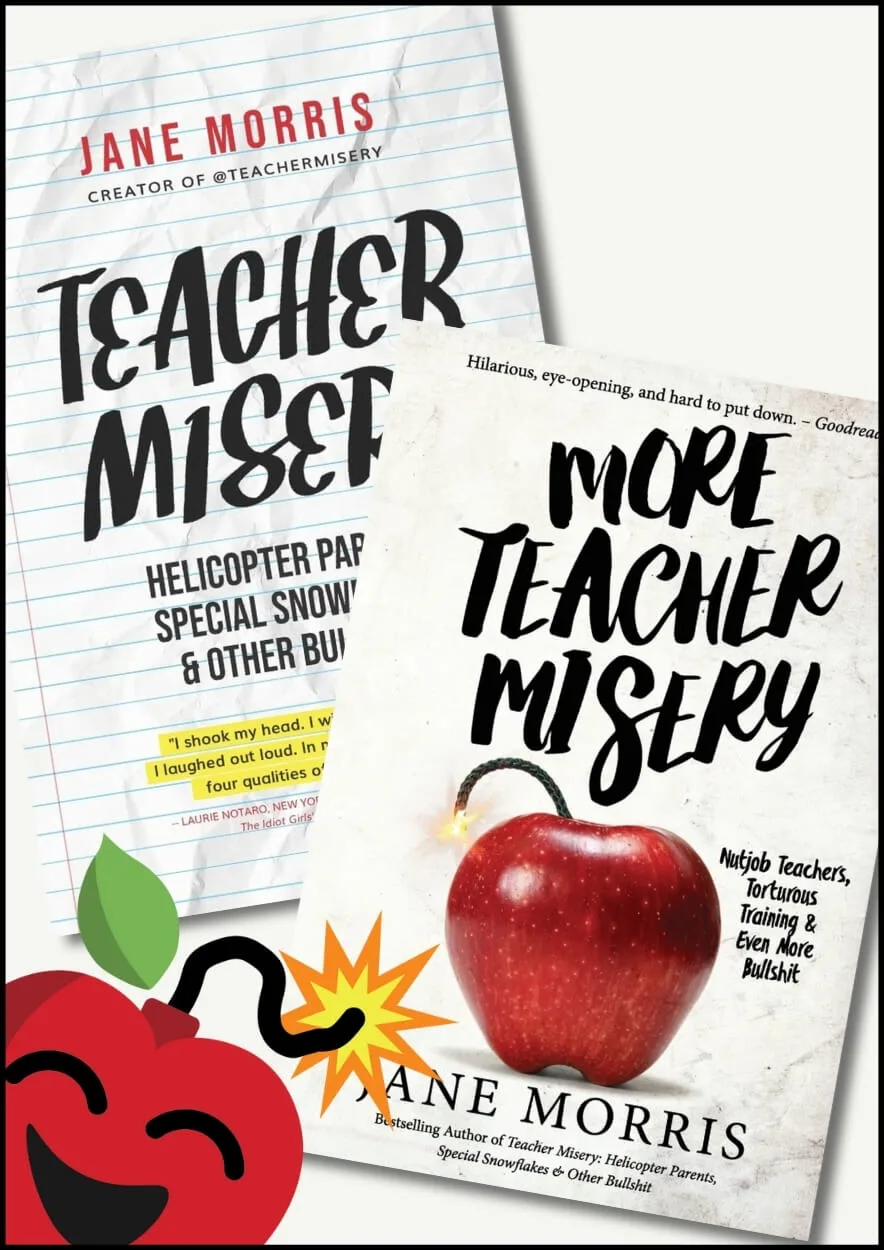Stressed? Burnt out? Exhausted to the point of falling asleep on the throne mid-toilet break?
You’re not alone! Being stretched thin is a rite of passage for teachers everywhere.
If you’re a teacher who has been stressed out to the point of mental and physical exhaustion, quitting teaching mid-year (or even mid-day) might be something that has crossed your mind more than once. But before you grab your favorite mug and smash the eject button, there are a few things to consider.
Teaching jobs mean contracts. They mean relative stability. It’s your career.
So before you leave teaching, consider what you’re leaving. Are you quitting a teaching job or your entire teaching career? And what is the appropriate course of action to take for such a highly personal decision? Maybe you don’t want to burn any bridges…
Or maybe you want to burn the whole MF to the ground!
Luckily, you’re looking at an expert quitter! I reached this point. I pushed myself to breaking point, and then I pushed further.
Until one day I snapped. And I left. And I never looked back. Now, all these years later, I live a dream life, built a dream job, and I have (dare I say it)… work-life balance.
And this could all be yours too! If you truly are thinking of leaving teaching mid-year, then someone has got to have your back
And I do! Everything you need is in this article, So let’s light those matches.

How to Quit Teaching Mid-Year: A 3-Step Strategy
In this post, we’re talking about the ins and outs of what you need to do before quitting teaching mid-year. I do need to make one caveat, however.
Waiting to quit until your teaching contract ends could be a more ideal situation. Allowing your contract to end naturally will save you a lot of hassle and make it easier for your students, team, and administration to adjust.
If you think you can, you could even consider riding out the school year by “quiet quitting” your teaching job. It’s a much lower maintenance way to phase out of the teaching profession. None of this is to convince you NOT to quit. I’m simply playing devil’s advocate and suggesting that sometimes taking the path of least resistance and finding a more optimal time to quit (while taking a few potshots at the school system on the way out) might actually suit you better.
But all that said, if leaving teaching mid-year feels more aligned with what you need personally, you are not alone. There’s no judgment here. Your physical health and mental well-being takes total priority over a job.

So let’s dig into building that exit strategy! Preparation is the key to success.
Here are the three steps you should take before you walk out the door.
Step 1: Learn Your Contract Before You Quit Teaching
Fully understanding your contract and the consequences of breaking it will help you decide whether leaving teaching now or sticking it out until the end of the school year is the best choice for you.
I’ll start off with an important disclaimer: I am not a licensed attorney nor a legal expert. This is not legal advice. I’ve never read your teaching contract, and I honestly wouldn’t want to.

Before you quit teaching, you must read your contract thoroughly. Then, talk to people in your district who may be able to support you and help you understand what rules or policies are in place.
If you have a union representative, they’re going to be the best person to talk to about your specific situation. There may also be an HR representative or other teachers who have been in your position and can give you some insight into the process. At the end of the day, these people are here to help. If the stress of teaching is getting too much for your mental and physical health, then reach out and seek professional guidance so you know your options.
What’s the worst that can happen? You’re quitting anyway!
But while I may not be a legal expert (and, again, none of this is legal advice), I do still know a few things about teaching contracts that might help you with leaving the profession.
What to Look for Before You Break Contract
Many districts have “good reasons” to leave teaching written into their contracts, even when quitting mid-year. Some may be concerns for your well-being, a spouse being relocated for employment, if you’ve experienced any traumatic events while teaching, or issues in your personal life such as caring for a sick family member. If you do have something like this written into your contract and the situation applies to you, it may be easier than you think to break contract without any major legal ramifications.

What you aren’t going to see listed as a “good reason” is getting a new job. What that means is that legal action could be taken by the district if you abandon your contract for another teaching position, or even a career switch. For this reason, you’ll want to research upfront what breaking your contract is going to mean and if there is any way to be formally released.
The repercussions may also be different at different points in the year. Specifically, check out how breaking your contract and leaving mid-year will affect your health insurance, paychecks, and any fines or penalties you may incur. These may be financial penalties or could even mean the suspension or loss of your teaching license!
Step 2: Plan Your Next Step After Leaving the Classroom
It’s scary to leave the financial security of a job – no matter how unhappy you are. If you’re planning on quitting teaching mid-year, have a timeline and plan in place for what comes after. That may include taking time off, having a quasi-sabbatical, finding a new job that’s low-stress, or even securing employment in a new career entirely.
There are many careers outside the classroom where you can apply your skills and experience. It might be daunting, but the secret truth about teaching is that it is so much more than just teaching and there are plenty of other domains you can transfer those skills to. However, if you’ve never applied for professional positions apart from teaching, this may seem challenging. But the good news is that you don’t have to figure it out alone!
My custom-designed program – Teacher Career Coach Course – is a step-by-step system created to help you transition from the classroom into your new career. This course will help you navigate the path ahead, from determining what jobs are suited to your skills to job searching to networking, resume writing, interviewing, and everything in between. Inside the course, you’ll also get access to a community of current and former teachers for encouragement and support.
We’ve helped thousands of former teachers with their transition to greener and greater pastures. If you’re seriously considering leaving the teaching profession, then don’t jeopardize your future, and don’t do it alone.
Let the professional ex-teachers at Teacher Career Coach have your back! Find your better life-beyond-teaching and never look back.
Step 3: Break the News that You’re Quitting Teaching
I urge you to be very mindful of when you start telling anyone at your school district about your intention to quit teaching in the middle of the year. Or whenever for that matter! Telling your admin or colleagues preemptively is a risky move that will likely make your working environment even more stressful.
One fatal flaw people make when quitting most jobs is to give an excess of notice thinking that will smooth things over. Often though, this just means a rather protracted length of time for things to be tense and uncomfortable and even passive-aggressive. You are not responsible for your colleagues’ and principal’s reactions.
When you do get that new employment contract in hand though, it is time to schedule a tough conversation with your principal. It’s best to do this in person whenever possible. Avoid burning bridges and just be direct and succinct. Don’t make concessions and give only the amount of notice you’re obligated to – not a second more or less. Teacher shortage or not, you don’t owe anyone a thing except yourself. The labor market is transactional: when it’s your time to walk away from the exchange, that’s what you do.

If you cannot keep it polite, just keep it very short and concise. Inform them of your decision to quit teaching and ask them how you can assist in a smooth transition. The best thing that you can do is maintain your class and professionalism as you move on to your new life.
In addition to having that conversation, you’re also going to want to draft a resignation letter, which is the formal way to give notice and break a contract. It usually specifies the date you will be leaving, alongside a short but eloquent reason why. If the reason feels like it might poke a few bears, then your letter should at least have a nice sentiment of appreciation for the opportunity and a professional goodbye.
Some districts request that you formally submit a resignation letter to the human resources department and/or your administrators. Again, go back to your contract, union rep, or HR department to make sure you are taking all the proper steps if you want to be formally released from teaching without potential consequences.
(It might also help to read an example of a resignation letter written under great duress. It is possible to be very honest and very respectful all at once!)
Some Final Tips to Help You Leave Teaching
Before you drop the axe, read through these tips. It’s a short summary of what we’ve covered already plus a few extra nuggets of wisdom from an ex-teacher-turned-career-coach:
- Consider your reasons closely. Physical health issues, severe anxiety or stress, or even just wanting a new career: these are all incredibly valid reasons to quit teaching! Just don’t make a rash decision in the spur of the moment – take time to mull it over and ensure it’s the right decision.
- Talk about it. As part of the decision process, crowdsource! Seek professional guidance, talk to mentors and former teachers, and get the support of your family and spouse.
- Expect some guilt when leaving the classroom. And an array of other unexpected feelings after quitting too. Hard choices require hard moments, but they don’t mean you’re on the wrong path.
- Vet your resignation letter. Don’t write it in the heat of the moment. Sleep on it, redraft, and get others to read it. With a truly horrible boss, it might not make a difference, but an effective letter can really smooth over the quitting process a lot of the time.
- Protect yourself. You’re quitting teaching, so stop thinking like a teacher! Put yourself first, have an exit strategy, and never show your hand. It’s ok to protect yourself from the school system, but it’s just as ok to try and quit the right way too.
- Trust your gut. Unexpected feelings aside, it knows what’s up. Leaving a bad job is much the same as leaving a bad relationship – listen to your gut and it will take you to where you need to be.
Get the Books That Started It All
Before the blog, the podcast, the merch store… there were the best-selling books.
If you like the content on this site, then you’ll LOVE the Teacher Misery books. They’re jam-packed with teaching insanity, ridiculous true stories, and all the commiseration about the profession you’ve come to know, adore, and respect.
Follow the links below to get your copies today!

Last Tip: Get Support When Quitting Teaching Mid-Year!

I wish I could tell you that your exit timeline would work out perfectly. But often in life, we have to make really difficult decisions in order to get to where we need to be.
Teachers who leave mid-year for new roles or their mental health reasons are often bullied, gossiped about by their peers, or just labeled as generally selfish. The assumption is they left for better opportunities, or they abandoned their responsibilities and took the “easy way out”.
A toxic work culture like that is one of the many reasons I hate the teaching profession. But it’s just another damn good reason for you to quit.
Again, don’t rush into the decision. Seek help… find support… take some time off first to think about it (lol). But if and/or when it’s time to quit, do it and don’t look back. It’s pretty rare in life we regret these hard decisions when we’ve processed them fully and made the call from a calm headspace.
And, in all honestly, it’s pretty damn rare to meet teachers that regret quitting teaching.
So if you’re reading this now, you will probably affirm that being in this situation is not easy at all. Teachers who quit in the middle of the year are usually at their absolute breaking point. There are so many tragic stories that I’ve heard where waiting until the teaching contract is up just doesn’t apply.
And if that’s where you’re at right now, help is right here. I’ve put my knowledge and expertise into building a team, career, and service dedicated to supporting leaving teachers with finding their next season in life.
For step-by-step support with your transition away from the classroom, check out the Teacher Career Coach Course. Join thousands of like-minded teachers and ex-teachers as you take your first steps into a new career and a much healthier lifestyle.
Take the plunge and never look back. If you could cut it as a teacher, then I promise there are heaps of other jobs you’re overqualified for that you can do after you’ve quit teaching.
Oh, but one more thing first… While you’re out there being a boss, kicking ass, taking names, and making empowering life-altering decisions, why don’t you go ahead and just…




Shannon Colclough
Thursday 9th of June 2022
I also had quit mid year teaching multiple times. It was the best decision of my life at the time and also it boosted my mental health.